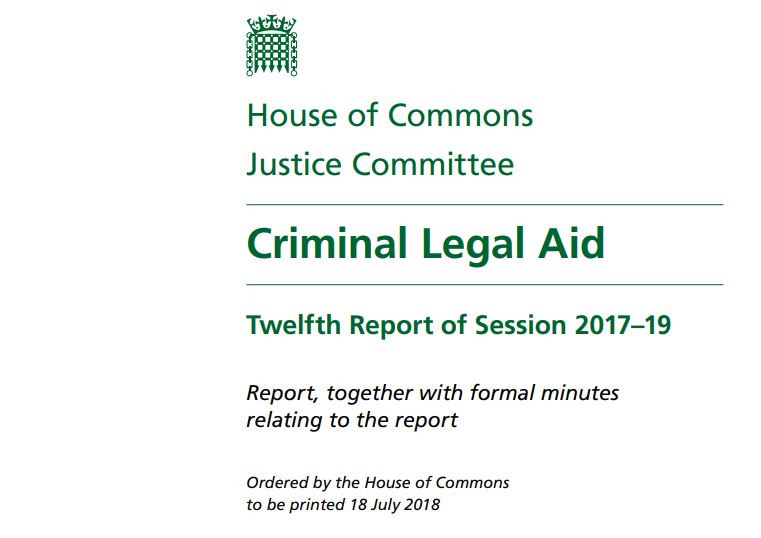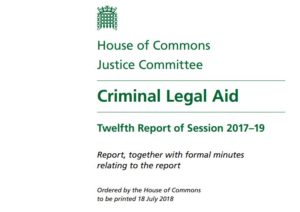A recent report from the House of Commons Justice Committee entitled “Criminal Legal Aid” has made the following observations and recommendations after hearing evidence across a wide range of issues. The conclusions are below.
Recent changes to the LGFS
- The evidence we have received suggests that solicitors have serious grievances about the Litigators’ Graduated Fee Scheme, given the absence of index linking for two decades, the 8.75% cut in fees imposed in 2014, and the recent reduction to the cap on pages of prosecution evidence.
- The Law Society’s judicial review of the Government’s decision to revise the LGFS means that it would not be appropriate for us to offer comment on the details of the scheme at this point in time. However, we have received evidence indicating a worryingly high level of demoralisation among criminal defence solicitors and threats to the economic sustainability of criminal defence firms, with negative implications for the criminal justice system—especially for defendants. We return to this issue below.
- We consider it regrettable that the Law Society has had to resort to bringing a judicial review to pursue its grievances about the LGFS. We recommend that the Ministry of Justice take urgent steps to avoid this dispute having to be resolved by the courts. Whatever the outcome of the judicial review, we consider there should be a wider review of criminal legal aid.
Recent changes to the AGFs
- We consider it regrettable that the Criminal Bar felt compelled to take direct action in response to the new Advocates’ Graduated Fee Scheme, given the potential for adverse impact on defendants and complainants, as well as on the functioning of the courts. However, the underlying reasons for the dispute can be understood, including the failure to ensure that fees keep pace with inflation, the staged fee reductions from April 2010 onwards, unhappiness about aspects of the revised AGFS and the Criminal Bar’s genuine and heartfelt concerns about the future of their profession and under-funding of the criminal justice system.
- While we welcome the Government’s decision to offer additional funding for the AGFS and the Criminal Bar’s decision to accept the offer, we do not believe that ending this specific dispute has resolved the underlying issues and it is clear that many barristers remain deeply unhappy about their situation and about the future of the criminal justice system.
- We acknowledge the challenges facing the Ministry of Justice in reworking the AGFS so that it is fair to advocates at all levels of seniority, and in ensuring that it is future-proofed against inevitable changes in the profile of Crown Court cases. We also recognise that the Ministry of Justice has made genuine efforts to address the concerns of the Criminal Bar. To provide for ongoing collaboration with the legal profession on refinements to the AGFS, we recommend that, without any further delay, a system of annual review be built into the AGFS, overseen by a panel which incorporates representatives from the Criminal Bar and solicitor organisations, Criminal Legal Aid 39 alongside Government representatives. The panel’s remit should include considering the inter-dependency between the AGFS and the LGFS, and the impact of changing the former on the operation of the latter.
Expenditure on criminal legal aid
- As we have observed, there is a common law right to legal advice, together with a right to legal representation for an accused person under Article 6 of the European Convention on Human Rights. We conclude that there is compelling evidence of the fragility of the Criminal Bar and criminal defence solicitors’ firms placing these rights at risk; we conclude that this risk can no longer be ignored.
- We also conclude that current difficulties in recruitment to the Criminal Bar could potentially have a negative impact on future recruitment to, and diversity within, the judiciary—in particular for judicial office holders in the criminal courts.
- Given these risks, we welcome the decision of the Ministry of Justice to consider legal aid for criminal law within the LASPO post-implementation review, as a first step in understanding the crisis that criminal legal aid is facing. We recommend that the output from this workstream be used to underpin a comprehensive and independent review of criminal legal aid, with the aim of devising a scheme that is sustainable and user-focussed; the review should adopt a similar approach to that of the recent independent review in Scotland. This review should be launched no later than March 2019 and should be concluded within 12 months.
Declining expenditure on the Criminal Justice System
- An effective criminal justice system which successfully prosecutes those who commit crime but which also protects the innocence of the accused unless the prosecution can prove their guilt is one of the pillars on which the rule of law is built. The effectiveness of the system also demands that the fabric of the criminal courts is properly maintained. We conclude that the under-funding of the criminal justice system in England and Wales threatens its effectiveness, and in doing so undermines the rule of law and tarnishes the reputation of the justice system as a whole.
- Our justice system is widely admired and the UK is a jurisdiction of choice for many individuals and corporate bodies that need to resolve disputes; nonetheless, it faces competition from other jurisdictions. We conclude that the under-resourcing of the criminal justice system undermines the prospects of successfully promoting our legal system abroad, a stated objective of the Government.
- We recommend that that the Government conduct an urgent cross-departmental review of funding for all elements of the criminal justice system, including criminal legal aid and the Crown Prosecution Service, with the aim of restoring resources to a level that enables the system to operate effectively; the details of this review should be published in advance and its timetable must ensure completion in time to influence the conclusions of the 2019 Spending Review.
Criminal Legal Aid Disclosure of unused material
- We conclude that the pressure placed on defence lawyers to fulfil their professional obligations by reviewing unused prosecution material without remuneration is fundamentally unfair and—with the continual increase in the amount of such material—likely to become unsustainable, and increasingly prejudicial to the defendant. We recommend that restoring legal aid payments for reviewing unused material above a certain page threshold be considered as part of the comprehensive and independent review of criminal legal aid that we have recommended above.
The link to the full justice committee report can be found here.





